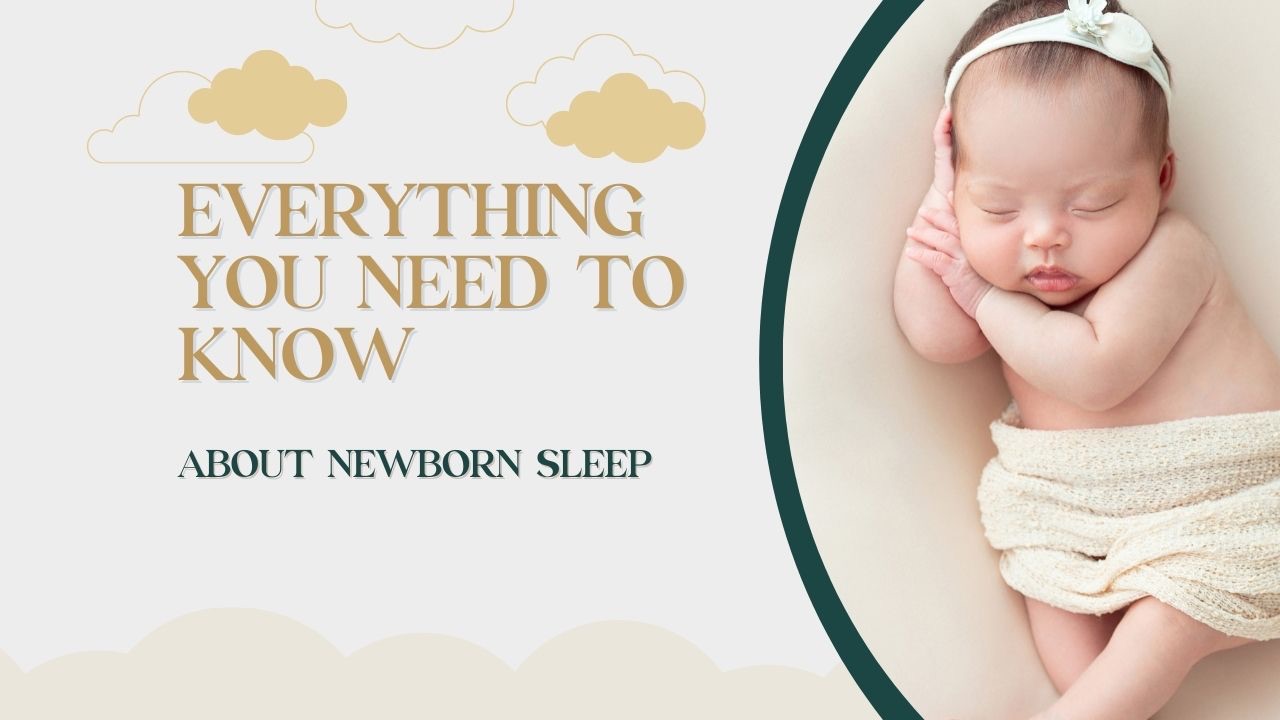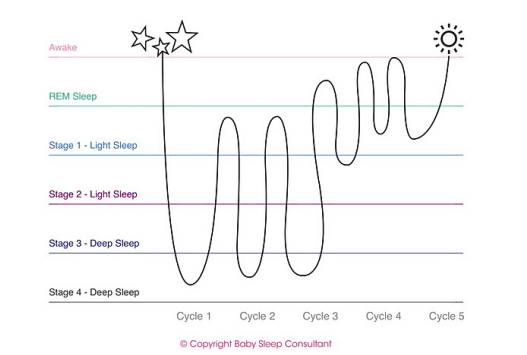Everything you need to know about newborn sleep!
Feb 08, 2023
If you've ever heard of the expression to sleep like a baby, you might be wondering who came up with it. My bet is that it was probably a man, who either did not have children, or left his wife to take care of the nightly wake ups! Either way, if you have a newborn in your house you may be wondering whatever happened to sleeping like a baby.
As a registered nurse clinician, and a pediatric sleep consultant, I get messages from new mothers every day asking why their newborn is not sleeping. The first two weeks of having a baby can be very difficult for new mothers as they heal from giving birth, while also learning to take care of a newborn. When we add to that sleep deprivation due to a newborn waking up multiple times per night, mothers face a high-risk postpartum depression and postpartum anxiety.
It's my responsibility as a sleep consultant, to diagnose the sleep problems that are preventing these mother's newborns from getting adequate sleep, and ultimately preventing them from getting the restorative sleep that they need in order to recover from pregnancy and childbirth.
So why does your newborn not sleep?
First we have to address the subject of sleep physiology. As adults, we sleep in sleep cycles. During each sleep cycle, we go from light sleep, to deep sleep, back into light sleep, and finally into REM sleep. Each sleep cycle takes approximately 45 to 90 minutes to complete. On average, we will cycle through five full sleep cycles per night. You can watch a full explanation of this here.

Newborns on the other hand, do not sleep in sleep cycles. They simply go from light sleep to deep sleep and remain in deep sleep for varying amounts of time. A newborn can sleep anywhere between 30 minutes to 3 hour, making their sleep patterns highly unpredictable. Due to their sleep cycles being inexistent, this can cause new mothers to struggle in structuring a daily schedule to ensure that their newborn is getting enough sleep. Although you cannot make a newborn sleep in sleep cycles, there are many things that you can do to lengthen the amount of sleep your newborn is capable of giving you in one stretch.
The fourth trimester
When your baby was still comfortably nestled inside of your belly, his sleeping environment was optimal. It was always dark, the temperature of the amniotic fluid was constant and comfortable, sounds were muffled through your abdominal wall, and as you walked your baby was gently swayed side to side. Once your baby came earth-side however, his environment suddenly changed dramatically. A newborn has to come to terms with the inherent discomforts outside of mommy's belly. Here, newborns can get cold, or too warm. The lights are bright, the sounds are loud, they suddenly experience hunger, and the discomforts of digesting milk. It is very easy for a newborn to become overstimulated, overtired, making falling asleep much harder.
What can you do to help your newborn sleep?
You can mimic the same environment that your baby experienced inside of your womb by using a swaddle. There are various types of swaddles available on the market, but for newborns the easiest ones to use are either muslin blankets or velcro swaddles. By tightly swaddling your newborn baby you are not only replicating the position in which he slept inside of you but also helping him keep his body temperature up. Newborns are unable to control their own body temperature and as a result can become cold very quickly or even overheat. Along with swaddling your baby, ensuring that his room temperature is approximately 72°F to 75°F will make sure your baby's core temperature is ideal. Swaddling also has the added benefit of preventing your baby from waking up due to the Moro reflex. The Moro Reflex is a reflex that newborns have that causes their arms to suddenly flail up in the air. This abrupt movement will often cause sleeping newborns to wake up and cry.
Can I feed to sleep?
There is a common misconception among mothers and sleep consultants alike that feeding to sleep will cause bad habits in a newborn baby. The truth is that if you are breast-feeding milk your milk is engineered to help your baby fall asleep faster. Not only that, but it will cause you to release particular hormones called prolactin that will help you fall back asleep quicker once you're done feeding your baby. Talk about recuperating from pregnancy insomnia! Newborn babies are made to be fed to sleep. Doing so ensures that their bellies are full and that they do not wake up preemptively from being hungry. Sleep problems are not caused by feeding your baby to sleep at bedtime, but may actually be due to dropping levels of glucose in their blood during the night. Glucose is what we use in order to create energy to sustain our body during sleep and during the day. If a baby did not eat enough before going to sleep it is very likely that his blood sugar levels will drop and he will wake up to ask for more. That being said, newborn babies have very tiny stomachs, so they can only eat in small and frequent feeds especially in the first few weeks. It is then normal for your newborn to wake up a few times per night.
In other words, your breastmilk is powerful magic juice, so use it!
For all the formula feeding mamas out there, the same applies to you. Feeding your baby before he goes to sleep will help him have a good long slumber.
What are dream feeds?
In order to help your newborn baby sleep for longer stretches in the first half of the night, as a sleep consultant I highly recommend that you use a dream feed. A dream feed is a feed that is offered to your newborn baby before he requests to be fed, and shortly after being put down to bed. Let's say that you've noticed your newborn wakes up at exactly the two hour mark after being put down for the night. In order to offer a dream feed, plan to go into his room after one hour and 45 minutes, 15 minutes before his patterned wake up, and offer him a feed without fully waking him up. Keep the lights as dim as possible, pick your baby up, bring him to the rocking chair with you or sit on your bed, and feed your baby until he is nice and full. If your baby is too sleepy to nurse or to accept the bottle, use a baby wipe to gently rub the back of his neck to wake him up just enough to make him want to eat. Using a dream feed will prevent your newborn from waking up completely and making it more difficult to put him back to sleep. This will also allow him to consolidate the first stretch of his night sleep and as a result prevent over-tiredness, leading to better sleep for the rest of the night. Reasonably expect your newborn baby to wake up once more around two, three, or four in the morning for a feed.
The powerful double feed
If you're breast-feeding you've probable heard of the double feed. When your baby wakes up between two, three, or four in the morning, instead of offering him only one breast and putting him back to sleep what do you want to do is :
1. Allow him to feed while still swaddled on one breast,
2. Then take his swaddle and pyjamas off, change his diaper, re-dress him, and then re-swaddle him.
This will cause your baby to wake up a little bit more.
3. You then want to offer your baby the second side or the second breast.
Doing this will allow your baby to take in a much bigger and more fulfilling feed so he ca sleep for much longer stretches. New mothers I work with usually come to only needing one dream feed and one wake up around three in the morning for a double feed. Mom only has to wake up once per night to feed her newborn!
Less sleep begets less sleep
Moms of newborns who refuses to nap, take short naps, may try to keep their newborns up for longer periods of time in hopes that they nap for longer. Unfortunately this actually has the opposite effect! Newborns have very short wake windows. A wake window is the time between the moment a newborn woke up to the moment he falls back asleep. A fresh newborn will have a wake window anywhere between 15 to 45 minutes at most! So if your newborn has been staying up for two hours or more he is probably extremely overtired. Babies and children are a little confusing. The more overtired they are, the more they desperately they need sleep, the more they fight sleep. This means it will be much harder to put them down to sleep and the sleep they do get tends to be superficial or light. This causes them to wake up more frequently, sleep for shorter periods of time, and wake still overtired making them fussy during the day. The same rule applies to bedtime. Putting your baby down to sleep later in the evening will not cause them to wake up later in the morning. In fact it may have the opposite effect. Watch your newborn baby's wake windows very closely and make sure you start your nap-time routine well before it's time for them to go back to sleep for their next nap.
My newborn still refuses to sleep
If after trying all of these tips your newborn baby still doesn't sleep enough and you're left completely exhausted while worried that your newborn may be sleep deprived as well, I recommend that you reach out to us. At BeBaby we only offer the best of the best when it comes to sleep education, helping mothers from the moment their babies are born. A professional sleep consultant on the BeBaby team can do a thorough evaluation of your baby's sleep, nutritional status, and overall health to determine what might be keeping your baby from sleeping adequately. From there your new born sleep consultant will be able to create a completely customized, one of a kind sleep plan to address your particular baby's sleep concerns and disruptors. With high touch and unlimited support, at BeBaby we ensure that every mother and her newborn baby can get adequate sleep.
Sleep deprivation is serious business. Click the link below to book a free call with us so we can figure out together what is causing your newborn not to sleep and come up with a plan that will suit your needs. We offer a variety of different sleep education or sleep training programs to meet everybody's needs.
A few more resources you may like to you take a peek at!
- Our free newborn sleep seminar

